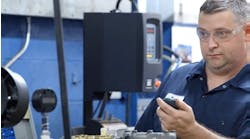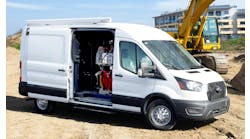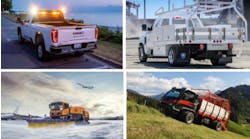Winter Equipment publishes new catalog
Sage Oil Vac offers service lube vans
Knowing how to turn a wrench isn’t the same skill as knowing how to run a truck shop, but Chad Powers, owner of Powers Truck & Equipment, didn’t even know what he didn’t know when he started the company 20 years ago. And while he had some success and managed to grow his N. Little Rock AR, distributorship, business really took off when Powers rebuilt his financials with the same care he takes in rebuilding equipment.
An important step was for Chad and wife Stephanie, who manages the office, to admit they needed some help.
“As a small business owner, we’re doing 22 different things,” Chad says. “We’re trying to grow this, market that, hire salesmen—sometimes we tend to forget about the business details. If we had money in the bank, we just kept on rolling.”
After asking around, Chad hired business advisor Randy Herlocker, a semi-retired banker, to analyze the company’s profit and loss statements and helps develop budgets.
For starters, like many small business owners, Chad and Stephanie had systems in place that generated information, but they didn’t know what to do with that information.
“For 45 years, I did some of the same things for people who wanted to bank with us. It’s really nice to sit down with people who are willing to learn,” Herlocker says. “The thing I’ve found is that most small businesses, family businesses, know how to make their widgets very well—they know how to do what they do. But they have no idea how to look at corporate governance, speeding up receivables, slowing down payables, managing the balance sheet.”
After meeting weekly during the initial months of the relationship, Powers and Herlocker now sit down twice a month. Yet, both Chad and Stephanie admit, it took some time to appreciate the effort.
“For the first few months, I thought it was hell,” Stephanie says. “I stayed up at night and typed and did all kinds of paperwork that he’d never had as a one-man operation,” she says. “I didn’t even have a good credit application or employment application. Everything was outdated. Randy showed us how to get compliant with everything, from A to Z. It was a lot of work, and it frustrated Chad.”
As Chad recalls, in the past he’d sometimes go for three or four months without looking at P&L, for instance.
“You’ve got to look at that paperwork two or three time a month. You’ve got to see what you’re spending and what you’re taking in to really grasp what’s going on,” Chad says. “You have to learn to read your general ledger and your P&L. A good financial adviser is a great value to a small company.”
To simplify, Herlocker started with a framework of three basic rules: “increase income, reduce expenses, or both.”
“It’s so gratifying when they start to understand what a difference having a business plan makes. It’s like a light bulb going on when they do X to get Y to happen—and Y happens,” he says. “They have made great strides in learning areas of business that are making them more proficient and highly profitable.”
Now, Chad tracks every aspect of the business, from shop efficiency to parts inventory. He also implemented performance bonuses.
“I can go back and see a full shop and think everything’s great—until I go look at the paperwork and see how many hours the guys billed. If I’m paying for 160 hours and they’re only billing for 100, I’m losing a lot because their efficiency level is way down,” Chad says. “Then they come to me looking for more money, but I can show them they need to be doing more work. I think they’re starting to understand the theory of how they’re going to get their raises.”
It’s not uncommon for a husband and wife to work together, Herlocker notes, but it is unusual for them to work well together. Each has to understand his or her responsibilities “and stay in that lane”—something Chad and Stephanie have been able to do.
“I’ve learned, probably the hard way, that from 8 to 4:30 Chad is my boss,” Stephanie says. “I keep our married life separate. When we’re here, it’s all about the business.”
Chad agrees. “She has the same mindset I have with this business: We want to be successful, and we’re 100% in to make it operate. We understand our roles.”
Getting started
Powers grew up around his father’s his father’s shop, the largest truck transmission and rear end builder in the state, and put in 15 years there, starting as a mechanic before becoming service manager. But he also had four brothers making a living with the company—and, to his mind, there wasn’t enough money, or future, for all of them.
So in 1998 he opened his own company.
“I had $17,000, two kids and third on the way,” Powers recalls. “I decided, ‘if I don’t do this now, I’m never going to.’ I was the mechanic, the phone answerer, everything.”
The state and area municipalities have been longtime customers for his range of vocational trucks—but, as he immediately found out, the government purchasing process can be both complicated and highly competitive.
“It was a different world, as far as trying put together bids to meet performance specs,” he says. “It still is about relationships, but you have to have a pretty decent piece of equipment, too. You’ve got to have something that does what they want to do; you have to get it to them and service it in the way you say you will.”
Persistence was the key to his early success, but more broadly Powers considers himself an entrepreneur. He attended trade shows to educate himself and to meet people, both potential customers and suppliers with products to sell.
“I’m driven to get things done and make money,” he says. “That’s just the way I do things. I was confident from Day One that I could make a living for myself.”
Still, he was challenged for several years while he was still head mechanic, salesman and business manager. He was careful not to take on more than he could handle, but it took nearly seven years before was comfortable leaving the shop work in the hands of others.
And once he was free to focus on sales, he began to expand the product lines, including garbage trucks, street sweepers, before moving into dump bodies and roll offs.
Maintenance work continues to provide the majority of revenue, and a tour of the shop shows jobs ranging from transmissions to radiators to engine work to electronics. Indeed, the company’s calling card is “service, service, service,” with a reputation based on his 35 years in the city, Powers explains. “Customers know I’m going to be here, every day.”
Today’s marketplace
The biggest challenge for Powers Truck & Equipment these days is having more maintenance work than the facility can handle, so construction is just underway on a new building. In addition to expanding the number of bays from six to ten, Chad is also adding a showroom to grow his retail parts business.
And he’s not at all hesitant to reinvest in such an expansion, noting an increasingly competitive local truck service market that would make it even more costly not to expand. Some 40 new service bays have come on line in the area recently, and those new bays will need service techs—putting more pressure on a very tight market for experienced labor.
“They’re not going to need those techs that are sitting at home—those are not the good guys—they need the techs that are working in somebody else’s shop,” Chad says. “They’re hunting and pecking, trying to offer this and that, to pull workers away from you.”
Powers has budgeted pay increases to retain his shop staff of five mechanics, and considers himself fortunate to have been able to hire a couple that are in their 20s and 30s.
“Finding somebody that has the want-to to get greasy and dirty is getting tougher and tougher,” he says—and it’s an issue Powers is all too familiar with: his own 30-year-old son has given the family business a go three times, but hasn’t stayed with it for more than a year.
“That generation just wants it all now—they don’t want to wait 20 years for it,” Powers says.
It’s important to find employees who see the business the same way the owner does, Herlocker explains, so Powers now uses a pre-employment screening assessment to determine the best fit.
As Stephanie recalls, current employees were given the assessment as a trial run. “It hit their personalities to a ‘T’,” she says. “And not only that, it shows you the way you can talk to them so they understand. It gives you management tools.”
“It’s an investment, but it really helps find qualified people,” Chad adds. “You put together a program of what you expect, and then you find that guy that expects the same things, who looks at things the same way you do. You need someone who’s self-motivated in this business.”
A distributor also needs good suppliers. Chad explains that he’s worked with a number of vendors for his entire career, but recently he’s had “difficult conversations” with a couple of them.
“I just want to make sure they’re as loyal to me as I am to them,” he says. “What makes them a good vendor is not selling to every truck shop in town. That way you can hold your margin and make it profitable to sell those lines.”
Looking ahead
A new emphasis on the retail parts business will also be an important piece of a five-year plan to double the revenue at Powers Truck & Equipment.
“I know from buying parts in this town for 35 years that every time I have to order a part, I have to wait,” Powers says. “And it ties up a bay in that shop. I think I can do better.”
But he will proceed carefully, with only modest goals for growth.
“What we’re looking for are A-moving items—we don’t want Bs and Cs that are going sit on the shelf for a year and half,” he says. “It’s a new venture for me. We’ve always worked on trucks and sold these bodies, so there’s going to be learning curve. And I’m probably going to order some product I probably don’t need.”
Along with the shop expansion and retail parts counter, Chad is also looking at investing in new service offerings. For example, he’s considering getting into the drivelines business, but that specialty requires a substantial upfront investment in the right equipment. And while the margins are good, he must consider the time it will take to develop the business. He’s also looking at equipment to clean diesel particulate filters; again, a substantial investment for a something very much in demand right now—but also a service need that could fade with the development of other emissions technologies.
With so many projects underway, retirement hardly enters into his thinking, Chad admits.
“My dad’s 73 years old and still shows up for work,” he says. “I just don’t think I’m the retiring type.”
But he does have another son, 19, who’s interested in the family business. He’s worked as a parts runner and shop cleaner, and is training to be a mechanic. But Chad also wants to put him on the new parts desk so he can learn to work with customers.
“There’s a lot more to this business than people think there is,” Chad says.
But whether Powers Truck & Equipment stays in the family or not, sound business planning will remain essential, Herlocker points out.
“Establishing good business practices not only helps them today, but it helps position a business for a future sale or a transition to the next generation,” he says. “Chad and Stephanie should be the poster children of a well-managed, successful and profitable family-owned and family-run businesses.”
For more information or contact, please visit: powerstruckequipment.com or Facebook page: Powers Truck & Equipment









